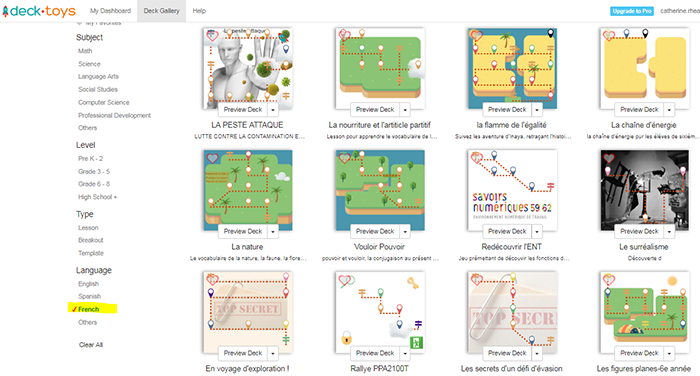Need Some Motivation Right About Now? Try Out Some Suggestions From The French Side’s Fall 2018 Publications
Let’s face it; sometimes you need a break from marking. After the last few 50-60-hour weeks where you have marked too much and slept too little, take some time to unwind. In my position as Profweb editor, I don’t think I can recommend a glass of wine in a cosy chair beside the fireplace. I can however suggest a few fabulous activities, to take your mind off marking, based on articles that have appeared in the French Edition of Profweb in the fall of 2018.
Games to get your mind off things?
As any gamer, from the dedicated player to the casual aficionado, will tell you, there’s nothing like an online game. Deck.toys is the website that will help you transform your quizzes into an amazing game. In the article, Catherine Rhéaume describes the features of the website. Memory games, associations, crosswords or puzzles can include various formats of questions (multiple choice, surveys, short or long answers, as well as drawings). The amusing learning activities that you create will definitely appeal to all of the gamers in your classroom.

Screenshot of various games available in Deck Gallery (Source)
Go to the movies with a philosophy teacher
In his article Du ciné à la philo: des activités clés en main pour susciter la curiosité et l’intérêt des étudiants envers les textes philosophiques ,David Bertet presents a website that contains 33 turnkey pedagogical activities using movies. David began using movies in his philosophy classes as a means to engage students and interest them in the study of the ideas and texts of the great thinkers. The worksheets are available on the website Du ciné à la philo. Each worksheet clearly identifies:
- The corresponding course
- The learning outcomes
- An overview of the film
- Index of the scenes
- Instructions for the projection
- The theme, philosophers and key words
- Questions students answer individually or in teams
Looking for a New Year’s teaching resolution? Try flipping your classroom without flipping out
Several articles on the French side present tips on how to create a flipped classroom.
Is it better to use your own videos or videos on the web for your flipped classroom? That is the question that Catherine Rhéaume answers in the article Créer ses propres vidéos ou utiliser celles qui sont sur le web? Inverser sa classe sans y passer ses nuits. Catherine talks about the pros and cons of each option. For instance, 2 teachers created 75 videos to flip an entire organic chemistry course. They believed the students would be more engaged because of the emotional bond they would feel seeing their teachers in the videos. Also, the teachers had read a study that said that it was more beneficial to the students when the entire (and not just parts) class was flipped. Those arguments explain the enormous amount of time they were willing to invest in the creation of the videos. If you want to flip your classroom but time is short, there are other things you can do:
- share the workload with a colleague
- personalise videos made by others
- provide texts or readings in the class notes
There is more than one road that leads to Rome!
Sample video created by Caroline Cormier and Bruno Voisard for their flipped chemistry class.
Even though many of the stories refer to flipping science classrooms, teachers of any discipline can definitely use the pointers given in Julie Belzile and Chantal Secours’ interview: Entrevue avec 2 enseignantes de chimie qui exploitent la classe inversée. They discuss how students must complete an entrance ticket at the beginning of each class. The entrance ticket gives the teacher an idea of how well the students acquired the basic knowledge presented in the video or the assigned texts the students saw in the flipped part before the class began. This just-in-time teaching strategy gives the teacher the opportunity to answer questions or correct any misconceptions before continuing on with more in-depth notions.
Experience a form of experiential learning
Mélissa Philippe answers a series of FAQs on entrepreneurship pedagogy in Pédagogie entrepreneuriale: les questions fréquemment posées. From an infographic containing the skills that define an entrepreneur to a short video presenting insights into entrepreneurial pedagogy, this article is an excellent introduction to this experiential teaching method. In addition to discussing the difference between entrepreneurship pedagogy, active learning and the flipped classroom the author answers questions on the underlying theory, the pedagogical sequence as well as the disciplines that can benefit from this teaching method.
The End!
Obviously not all of the captivating articles from the French side are summarized here. Hopefully though, this year-end review showcased some innovative ideas you may be tempted to try out next session. In the meantime, I hope you enjoy every minute of your well-deserved holidays.
Warmest wishes for Happy Holidays from the entire team at Profweb!

